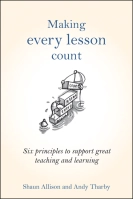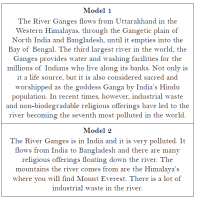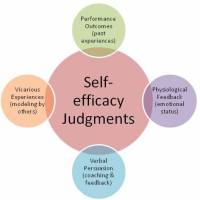 Last Friday we had an INSET day. Our focus was thinking about how we can push and challenge those students with a high stating point, so that they make even more progress. Our starting point was to think about something we often get wrong in education – thinking that correlation and causation are the same thing.
Last Friday we had an INSET day. Our focus was thinking about how we can push and challenge those students with a high stating point, so that they make even more progress. Our starting point was to think about something we often get wrong in education – thinking that correlation and causation are the same thing.
The previous week, I had been fortunate to hear David Didau talk at the West Sussex Deputies Network conference. David mentioned how The Welsh Education Department had been trying, a few years ago, to identify why students in Wales, were underachieving compared to students in England. They noticed that boys were underperforming compared to girls, and so saw this as a possible cause. This was useful as it seems entirely feasible and is of course, easy to plan interventions around. It’s convenient. The problem is though of course, that it’s a correlation, not a cause. Upon further examination of the data, they found some more inconvenient truths i.e. that there was a correlation between right/left handedness and academic achievement and whether you lived in an odd/even house and academic achievement. This highlights the problem we have. Making every student in Wales move into an even numbered house, is unlikely to fix the problem! But we do this all the time – identify an issue, look for a correlation, mistake this for causation and then plan interventions around this perceived cause. It’s a familiar story, that results in our time and efforts being directed at the wrong thing.
The aviation industry doesn’t do this. When a fatal crash happens, they scrutinise the available data from the ‘black box flight recorder’ and find out the exact cause of the accident – and address it. As a result, fatal crashes are very rare (as shown in the graph above) and are seldom repeated.
So when looking at the achievement of high starting point students, there are many things that could affect their attainment – their home circumstances, their friendship groups, their experience in primary school – many of which we can’t, as teachers, influence. However, one thing we can have an impact on is how we teach them, so we focused on that.
From – Making every lesson count
Explanation
Do we know the H sections of the specification inside out and talk about how to teach it well?
Our ‘Subject Planning & Development Sessions’ provide a perfect opportunity for teachers to talk about the more challenging aspects of the curriculum and how to teach them well:
- What are the really abstract ideas and how do we make them concrete?
- How should we chunk up our explanations of this difficult content?
- What are the bits that they find really difficult?
- Is there a really good image or piece of writing I can show them, that will really get them thinking about the topic?
- What are the common misconceptions that students have around this topic and how can we overcome them?
- What surface knowledge do students really need, in order to fully understand this challenging content?
Modelling
Do we show students precisely and step by step how to get full marks in H questions?
The most effective way to do this is not by having a pre-prepared answer to a hard question on a powerpoint to show students, but to actually work through the question on the whiteboard. By doing this, you can share your thought processes with them, ask them questions, make mistakes and correct them etc. The best PE teacher, won’t just show a student a video clip of a great javelin thrower and tell students to copy this. They will model it to them and break it down, step-by step, either themselves or with a student, stopping and starting, pointing out key parts of the process, asking questions etc. The same should apply when modelling an answer to a really hard science question, or a history essay etc.
Practice
Do we give students access to lots of hard exam questions on a regular basis?
When tackling the really hard questions with students, it is tempting to just give them one or two to try – with the reason given, often something along the lines of ‘You won’t have many questions like this, so we’ll just do one or two’. This is an odd idea. Usain Bolt competes in the Olympics once every four years, but puts in huge amounts of practice every day. We should take the same approach with our high starting point students – give them the opportunity to practice the hard questions lots and lots, so when it comes to the exam, it’s like second nature.
Questioning
Do we promote deep thinking through ‘think hard’ questions during our lessons?
Martyn Simmonds discussed the reasons why we ask questions as teachers:
- To test understanding of a new concept.
- To deepen and develop understanding.
- To ensure that students take a share in the cognitive work of the classroom.
- To help you form and sustain your classroom culture.
- To create curiosity.
The second bullet point ‘to deepen and develop understanding’ is especially relevant for high starting point students. We need to think about the following when planning challenge through questioning in our lessons. The students:
- Need to know that these questions are explicitly hard. So tell them ‘this next question is difficult and you’ll find it hard, but that’s OK as we’ll go through it together’
- Need to know that ‘struggling’ is ok and that the classroom environment allows them to take risks with their thinking. By sharing your mistakes, or common student mistakes, as you model (see above) they will become more comfortable with struggling themselves.
- Need to feel supported to challenge themselves – so praise the effort and hard work they put into challenging questions/ work.
Some things for us to reflect on as individual teachers and subject teams to strengthen our questioning:
- Do you know what students with a high starting point should know and be able to do in your subject?
- Do you include this in your teaching and ‘scale up’ in both KS3 and 4? So, when teaching KS3, do you stretch students into KS4 content and likewise into KS5 when teaching KS4?
- Do you know the hardest questions they will be expected to answer in their exams, in your subject? Can you get full marks on those questions? Have you tried recently?
- Do you plan specific ‘think hard’ questions for students to do in lessons, in order to support their learning in these areas? Do you expect students to complete these or they an added ‘extra’?
Feedback
Do we give them quality feedback on how to develop and improve their work to the highest standards?
Martyn has been looking at feedback and marking across the school. At Durrington, each curriculum area outlines how and when they will carry out effective feedback, to fit the context of their subject. This is in line with guidance that Sean Harford (OFSTED National Director) has given to his inspectors last week:
Martyn reported that it was great to see subjects thoughtfully shaping their feedback, around strategies that work best for them – including verbal feedback, written feedback and self checking. Students were also able to articulate clearly, how they received feedback about how to improve in each subject, and how this has helped them. We just need to ensure that we keep this under review in all subjects, so that feedback/marking is:
- Effective in terms of helping students to improve their learning.
- Manageable and sustainable for teachers.
Chris Runeckles has been talking to Y11 and Y7 high starting point students about their experience in school – one of the areas was around feedback. The good news, in relation to feedback, is that the majority of students said that there is an expectation that they should respond to the feedback their teachers give them and that they do respond to it. They also reported however, that the feedback they receive, doesn’t always make them think hard. So this is something we can work on – making sure that the feedback we give higher starting point students, actually makes them think hard, so that they deepen their thinking and understanding of the subject.
Chris has also been visiting the lessons of teachers, that our Y11 high starting point students reported made them think the hardest. He has noticed the following things in these lessons:
- Expertise reversal effect – students were given limited instructions about “how to” when it came to tasks, because this had already been established. This freed their working memory to be getting on with the thinking required for the task.
- Culture – every conversation between students was about the subject. This was a significant observation. The students were so engaged with the subject, that it was all they wanted to talk about.
- Expectations – talking to a student he was clear the environment had improved his attainment. He stated that the ‘high expectations of the teacher and everybody else in the classroom, just made him believe that he could do it’.
Posted by Shaun Allison













Reblogged this on Design Technology & Engineering Teaching Resources and commented:
Awesone article on ‘What to do with the clever ones?’…
Excellent s Thank you
Sent from my iPad